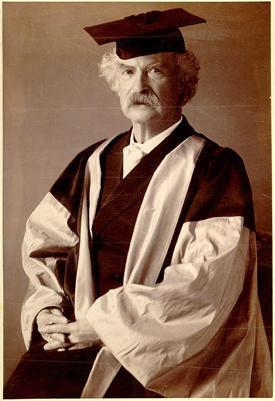There’s a lot of talk these days about university reform, and coursing through it I see a beautiful and tragic dream of the future. Dreams, of course, meld idiosyncratic images and mine blends Detroit, Mad Men, and the great speeches of Samuel Clemens.
We all know the story: Boosters of online education suggest that American higher education should rely upon a small group of superstar lecturers, computer-based grading systems and thousands of adjunct graders to deliver content to the masses. To benefit from economies of scale, some say we ought to have centralized national committees that decide what gets taught and who gets to teach it. Advocates claim online education will cut costs, improve educational outcomes, and bring higher education to underserved populations.
Such efforts carry the excitement of novels for me. As in Mad Men, the details of work and visions of the future are riddled with action and curiosity. Much of the drama, of course, comes in waiting to see what will happen. Will we break social hierarchies, educate every American, and revitalize a lagging economy? On the job front, will employers readily hire people with online degrees? Will we create an exceptionally creative and dynamic economy with online education or add to the legions of overeducated and underemployed young people? And what will happen to the humanities, challenged as they are to bring engaging discussion online? Will they be too expensive to deliver and thus rendered irrelevant? Finally, how will professors respond to these online reform efforts? Some Harvardprofessors have pushed back against EdX, but will they succeed?
Of course, as in Mad Men, many of the characters are compelling and hard to ignore. Most players pursue admirable aims, while a few see profit at every turn. Technical wizards test the boundaries of possibility on a daily basis. Finally, for intrigue, we have one prominent voice whose book describes his genius and 6’8” stature as well as his passion for greater access. And don’t forget the eminent MOOC professorwho aped Wal-Mart management when asked to address his responsibility to the academic community. Finally, I’m sure if we looked hard enough, we'd find plenty of romance.
Woven through this drama are the fantastic lectures of Samuel Clemens. In the future, students will have nothing but the most exciting, engaging, and informative professors. We've all had amazingly inspiring teachers but also think of the dull ones: the ones that mumbled, yawned, or trailed off into empty confused space, blankly staring back at their audience of students. With MOOCs everyone will be taught by Samuel Clemens. Just as he regaled audiences around the world with stories of adventure and love, dynamic professors like Ann Swindler and Harold Scheubwill turn tedious degree requirements into something exciting, engaging, and memorable. University education will be as entertaining as it is informative. Students will have not just a few memorable professors but rather four consistent years of intellectual challenge, adventure, and stimulation. Graduates will emerge with minds polished sharp and appetites expecting the best. Why shouldn’t universities be as good as multiple seasons of Mad Men? Perhaps they will be…
However, the specter of Detroit and other post-industrial cities looms just out sight, haunting these dreams. Walking around campus at the University of Wisconsin-Madison the place would seem to last forever. Grand and bland buildings alike bustle with life, looking impenetrable to change. Construction never stops and thousands of eager applicants are rejected each year. And yet, I imagine this same assurance was felt by workers in Detroit, Cleveland, and Milwaukee during the 1950s and 60s. On their evenings off from Pittsburgh steel plants, my grandparents drove new cars around a dynamic city, stopping here to eat an ice cream or there to dance the jitterbug. On weekends, they strolled down crowded Braddock Avenue for Catholic mass and later Sunday brunch. All of this is gone of course. Much of Pittsburgh, like Detroit, is a wasteland. Braddock Avenue is an icon of post-industrial America, its crumbled buildings photographed as ruin porn. My grandparents’ cathedralsnow have collapsed roofs, and the mansions of the elite lean on dilapidated foundations, smiling back with broken windows.
Will lecture halls, our hallowed cathedrals of learning, sit dormant, fade, and eventually crumble to the ground? Of course they will. Why should a thousand different sociology professors teach Introduction to Sociologyevery fall when the best professors from Berkeley, Princeton, Yale and UNC-Chapel Hill could take turns teaching to the entire country?
Will universities become internet-photo-curiosities, idle distractions from work-a-day routines? It’s quite possible. As undergrads, friends and I explored abandoned amusement parks along the Jersey shore, photographing roller coasters and conjuring various ghosts creeping through fun-homes and tunnels-of-love. You may have explored other ruins, forgotten castles or asylums perhaps. It’s easy to imagine wealthy young people doing the same years from now, walking around abandoned campuses with overgrown grass and broken windows. They will photograph the collapsed arches of our lecture halls and wonder what it was like to sit for an hour in those hard wooden chairs. They’ll do their best to envision crowds of students rushing to class.
Like any good historical drama, this dream’s actors are vividly human, their efforts creative and disturbing. Such a future is exciting and beautiful, but it is also tinged with tragedy. Poised as we are on the brink of a new future, you can almost see Samuel Clemens watching us in white with a bushy mustache, smirking, “Never let the campus get in the way of your education.”
